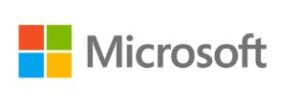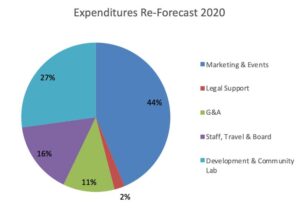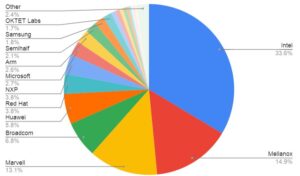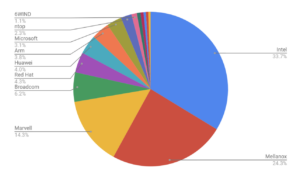A new major DPDK release is now available: https://fast.dpdk.org/rel/dpdk-20.11.tar.xz
Our Thanksgiving gift to the ecosystem is the biggest DPDK release ever, with:
- 2195 commits from 214 authors
- 2665 files changed, 269546 insertions(+), 107426 deletions(-)
The branch 20.11 should be supported for at least two years, making it recommended for system integration and deployment. The maintainer of this new LTS is Kevin Traynor.
The new major ABI version is 21. The next releases 21.02, 21.05 and 21.08 will be ABI compatible with 20.11.
Below are some new features, grouped by category.
- General
- mbuf dynamic area increased from 16 to 36 bytes
- ring zero cop
- SIMD bitwidth limit API
- Windows PCI netuio
- moved igb_uio to dpdk-kmods/linux
- removed Python 2 support
- removed Make support
- Networking
- FEC AP
- Rx buffer split
- thread safety in flow API
- shared action in flow API
- flow sampling and mirroring
- tunnel offload API
- multi-port hairpin
- Solarflare EF100 architecture
- Wangxun txgbe driver
- vhost-vDPA backend in virtio-user
- removed vhost dequeue zero-copy
- removed legacy ethdev filtering
- SWX pipeline aligned with P4
- Baseband
- Intel ACC100 driver
- Cryptography
- raw datapath API
- Broadcom BCMFS symmetric crypto driver
- RegEx
- Marvell OCTEON TX2 regex driver
- Others
- Intel DLB/DLB2 drivers
- Intel DSA support in IOAT driver
More details in the release notes:https://doc.dpdk.org/guides/rel_notes/release_20_11.html
There are 64 new contributors (including authors, reviewers and testers). Welcome to Aidan Goddard, Amit Bernstein, Andrey Vesnovaty, Artur Rojek, Benoît Ganne, Brandon Lo, Brian Johnson, Brian Poole, Christophe Grosse, Churchill Khangar, Conor Walsh, David Liu, Dawid Lukwinski, Diogo Behrens, Dongdong Liu, Franck Lenormand, Galazka Krzysztof, Guoyang Zhou, Haggai Eran, Harshitha Ramamurthy, Ibtisam Tariq, Ido Segev, Jay Jayatheerthan, Jiawen Wu, Jie Zhou, John Alexander, Julien Massonneau, Jørgen Østergaard Sloth, Khoa To, Li Zhang, Lingli Chen, Liu Tianjiao, Maciej Rabeda, Marcel Cornu, Mike Ximing Chen, Muthurajan Jayakumar, Nan Chen, Nick Connolly, Norbert Ciosek, Omkar Maslekar, Padraig Connolly, Piotr Bronowski, Przemyslaw Ciesielski, Qin Sun, Radha Mohan Chintakuntla, Rani Sharoni, Raveendra Padasalagi, Robin Zhang, RongQing Li, Shay Amir, Steve Yang, Steven Lariau, Tom Rix, Venkata Suresh Kumar P, Vijay Kumar Srivastava, Vikas Gupta, Vimal Chungath, Vipul Ashri, Wei Huang, Wei Ling, Weqaar Janjua, Yi Yang, Yogesh Jangra and Zhenghua Zhou.
Below is the breakout of commits by employer:
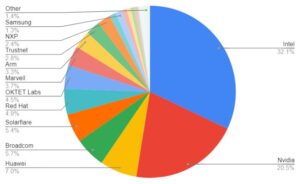
Based on Reviewed-by and Acked-by tags, the top non-PMD reviewers are:
128 Ferruh Yigit <ferruh.yigit@intel.com>
68 Bruce Richardson <bruce.richardson@intel.com>
63 Andrew Rybchenko <andrew.rybchenko@oktetlabs.ru>
62 David Marchand <david.marchand@redhat.com>
53 Ruifeng Wang <ruifeng.wang@arm.com>
40 Konstantin Ananyev <konstantin.ananyev@intel.com>
38 Ajit Khaparde <ajit.khaparde@broadcom.com>
37 Ori Kam <orika@nvidia.com>
33 Honnappa Nagarahalli <honnappa.nagarahalli@arm.com>
New features for 21.02 may be submitted during the next 3 weeks, in order to be reviewed and integrated before mid-January. DPDK 21.02 should be small in order to release in early February: https://core.dpdk.org/roadmap#dates
Please share your roadmap.
Thanks to everyone who helped make this release happen – what a great way to wrap up 2020!

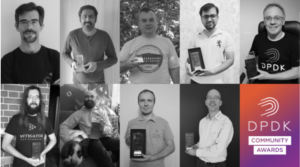
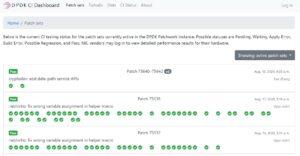 Lastly, for the currently operating testing, is the community lab, hosted at the UNH-IOL. Testing in the community lab is also tracking both the main branch and submitted patches, providing a combination of compile, unit testing, functional testing, and performance testing. The compile and unit testing also add one additional dimension, with some cooperation to downstream projects, such as Open vSwitch and SPDK, providing early detection of a patch breaking outside of DPDK directly. For the functional and performance testing, the lab hosts a number of “bare-metal” systems with NICs provided by DPDK member companies, including Broadcom, Intel, Mellanox, and NXP currently. The performance testing runs a throughput test on each NIC (in some cases there are multiple speeds or hardware variants included), checking for a drop in forwarding performance from a well known reference. Gold and Silver DPDK member companies are eligible to submit hardware for hosting in the community lab and are strongly encouraged to do so by the governing and tech boards of DPDK, as this directly expands the testing coverages. Functional testing is the newest and growing aspect within the community lab output, adding more tests running on “bare-metal”, based on the DTS (DPDK Test Suite) project. Aiming to provide majority coverage for the NIC features list. The community lab results also feed directly into the patchwork system, with additional information available on the lab portal as well:
Lastly, for the currently operating testing, is the community lab, hosted at the UNH-IOL. Testing in the community lab is also tracking both the main branch and submitted patches, providing a combination of compile, unit testing, functional testing, and performance testing. The compile and unit testing also add one additional dimension, with some cooperation to downstream projects, such as Open vSwitch and SPDK, providing early detection of a patch breaking outside of DPDK directly. For the functional and performance testing, the lab hosts a number of “bare-metal” systems with NICs provided by DPDK member companies, including Broadcom, Intel, Mellanox, and NXP currently. The performance testing runs a throughput test on each NIC (in some cases there are multiple speeds or hardware variants included), checking for a drop in forwarding performance from a well known reference. Gold and Silver DPDK member companies are eligible to submit hardware for hosting in the community lab and are strongly encouraged to do so by the governing and tech boards of DPDK, as this directly expands the testing coverages. Functional testing is the newest and growing aspect within the community lab output, adding more tests running on “bare-metal”, based on the DTS (DPDK Test Suite) project. Aiming to provide majority coverage for the NIC features list. The community lab results also feed directly into the patchwork system, with additional information available on the lab portal as well: 
